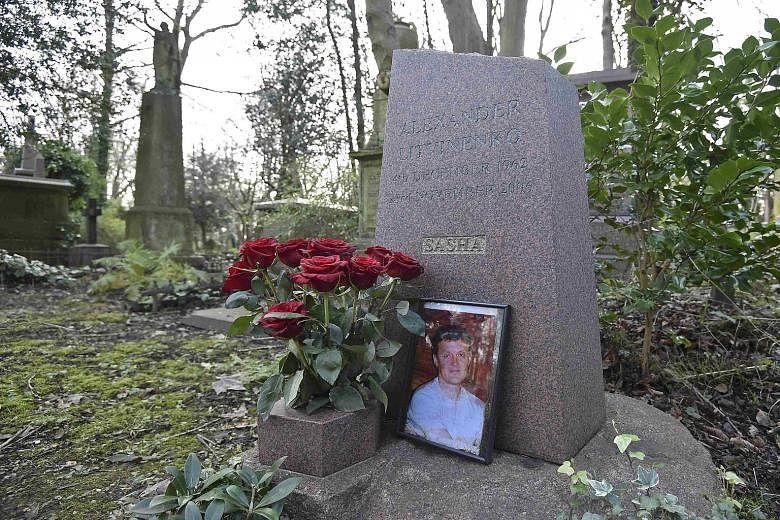Russia has a long tradition of eliminating its enemies in complicated ways. During the 19th century, the Okhrana, Russia's old imperial secret police, preferred to bump off opponents of the czar through "accidents", such as potholes which would suddenly open to swallow their victims.
The Russian empire's communist successors improved on these techniques during the 20th century. Yevhen Konovalets, a nationalist who advocated the Soviet Union's break-up, was blown to bits by an explosive birthday cake. Leon Trotsky, a noted communist revolutionary who fell out with the Soviet rulers, was dispatched from this world when an "admirer" split his head into two with an ice pick. And Georgi Markov, a dissident exiled writer from Eastern Europe, was killed while walking over a London bridge one September evening in 1978 by a poison pellet fired at him from the tip of an umbrella.
Seen from this perspective, the recent findings of a British legal inquiry which concluded that Mr Alexander Litvinenko, another Russian exiled opponent, was murdered in London after he was poisoned with highly radioactive polonium is not surprising. Nor was Russia's response, which dismissed the allegations as just a figment of Britain's "fertile imagination".
Still, the episode is a major embarrassment for the Russian security services, one which may persuade them to rethink the usefulness of such targeted assassinations.
The Russians already reserve such spectacular murder plots for the very few opponents who are deemed to be of critical significance either because of what damage they can inflict, or because of the information they possess.
Mr Litvinenko fitted both these categories. For not only was he a former senior officer of the FSB, Russia's security service and heir to the feared Soviet-era KGB, but he was also part of a more select unit within the FSB which monitors Russia's own organised crime.
In Russia, such a job is always a political dynamite, for organised crime networks are both enemies and allies of the regime. They help generate and launder cash for senior government officials and fabulously rich oligarchs, and they play a key role in Russia's internal power struggles. For these reasons, only Russian President Vladimir Putin and some of his key associates in the Kremlin have access to all the intelligence material Mr Litvinenko and his colleagues produced.
Mr Litvinenko's defection to Britain in 2000 was a heavy blow to the FSB partly because it forced the organisation to recheck the credentials of other top agents, but also because nobody in Moscow could be sure how much information he took with him.
The Russian authorities concluded that Mr Litvinenko had to die because years after his defection, his knowledge of people and networks still helped Western intelligence services in "connecting the dots" between various fragments of other information they possessed.
But killing someone in a complicated way is inefficient. Mr Litvinenko could have been shot in a London street or "accidentally" run over by a car without resorting to elaborate poisoning procedures with a radioactive material so rare that it is only mass-produced in one single laboratory in the world, in Sarov, 800km south-east of Moscow.
So, why did the Russians prefer a spectacular murder technique? The reason is that it serves as a badge of honour for the intelligence service which mounts them. The point was not just to kill Mr Litvinenko, but to also send a warning to other potential defectors.
Spectacular assassinations are also a good recruiting tool for some intelligence agencies - the more mysterious the murder, the more sophisticated the agency appears and the better brains it can attract. A common question on the minds of potential recruits to Britain's Secret Intelligence Service, commonly known as MI6, is whether it has agents with "licence to kill". It doesn't, but because James Bond apparently did, fiction remains more powerful than fact.
One of the main reasons why Mossad, the Israeli intelligence agency, is also held in high esteem is that it prefers to assassinate its enemies with unusual methods, such as remotely detonated mobile phones.
Seen from this perspective, polonium was the perfect weapon to kill Mr Litvinenko. The radioactive substance discovered by Nobel Prize- winning scientist Marie Curie in the late 19th century and named after Poland, her country of origin, occurs naturally and is harmless unless it enters a body. But if ingested, it is one of the most toxic substances known, a staggering one trillion times more deadly than cyanide. And, just as significantly, because its particles are so easily absorbed by other materials, it is hard to trace. In short, this was the perfect murder weapon: guaranteed to kill, but almost impossible to detect.
The snag for the Russians is that Mr Litvinenko helped solve his own murder. As he lay dying in a hospital bed in London in November 2006, rapidly balding and with his internal organs failing - classic symptoms of radiation - he told investigators what they may want to look for.
And once polonium was identified, the British authorities had no difficulty in piecing together not only the identity of his assassins, but their every move, down to even the hotel toilet cubicle in which they prepared the poison. The deadly substance which was meant to disguise their murder became their tracking device, a classic case of unintended consequences.
Moscow will have no difficulty brazening this episode out. And London still has an interest in not revealing all the information it has. Although Russian spooks have succeeded in killing Mr Litvinenko, the fact remains that the FSB's techniques have been exposed and its agents publicly named.
The Litvinenko story serves as a reminder of a wider problem for intelligence services: that in an age when closed-circuit TV monitors are ubiquitous and forensic science so advanced, clever assassination plots are increasingly a liability, exposing a country's spies to unsustainable risks.

